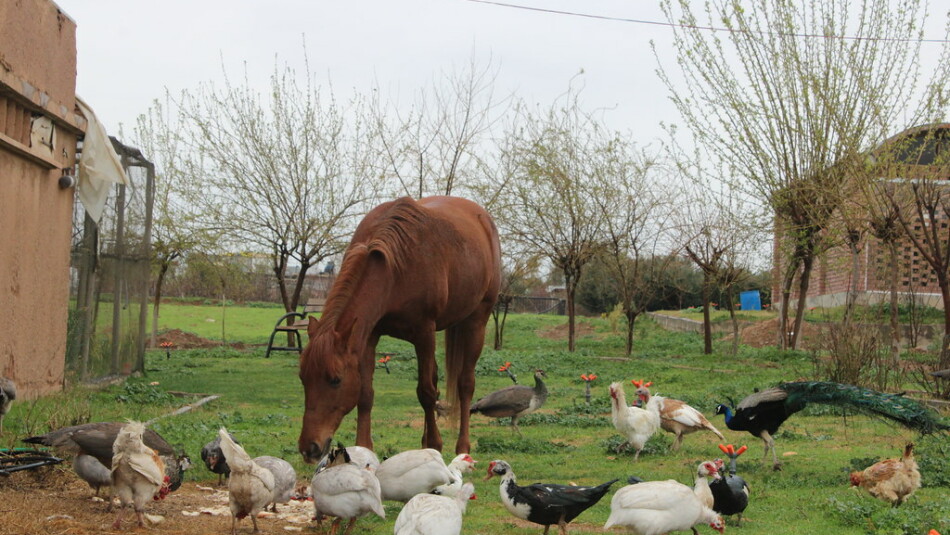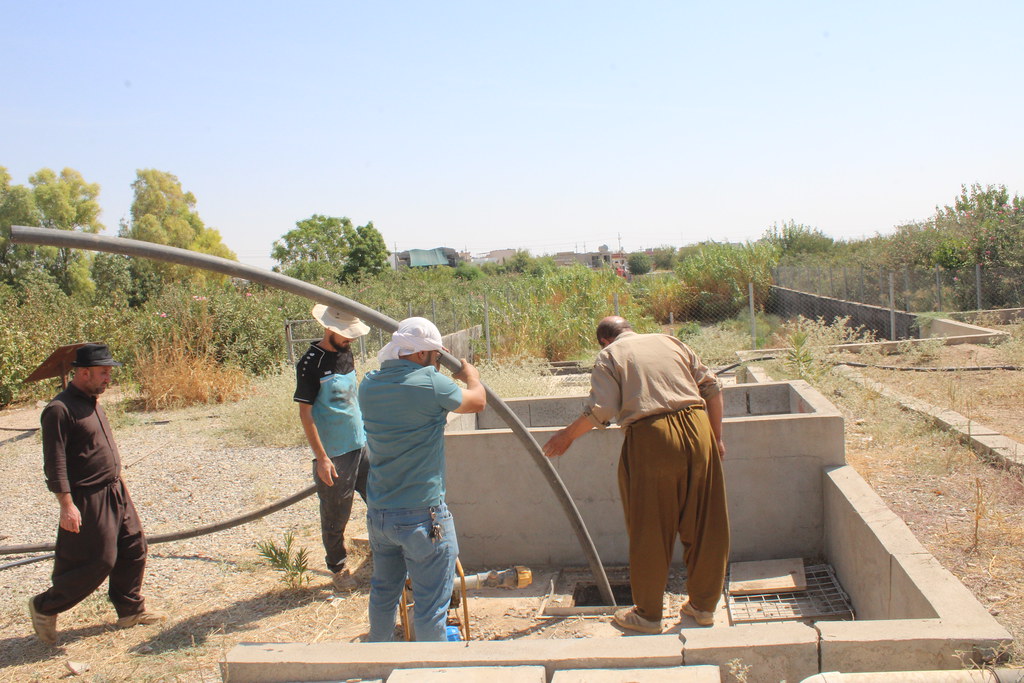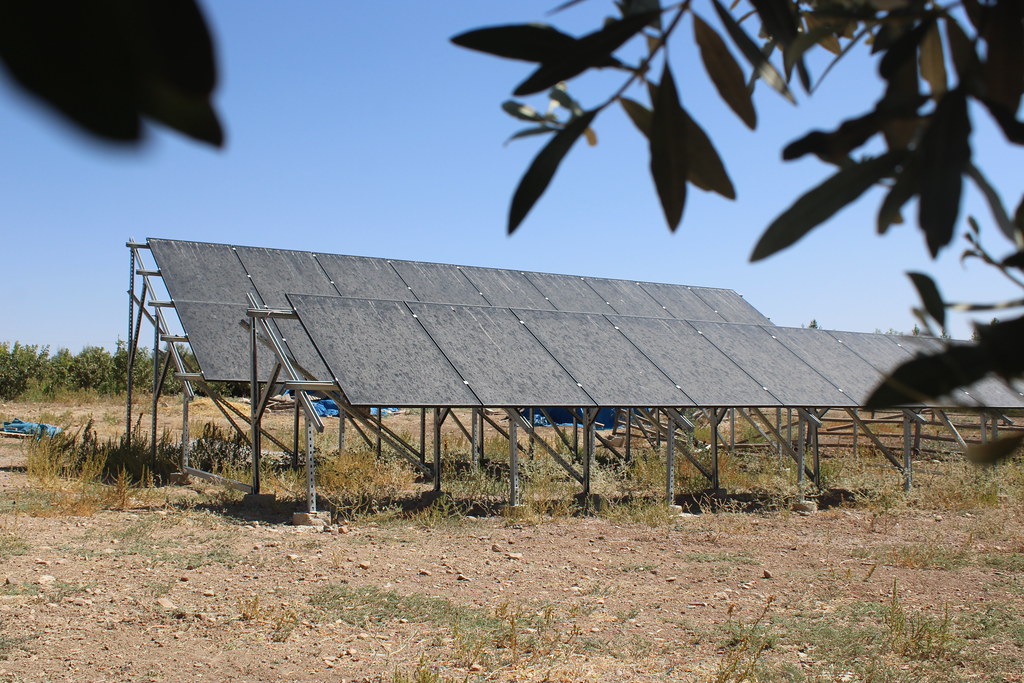
Wastewater in Chamchamal is no longer worthless. It can now be used for irrigation and livestock farming after a few stages of treatment. The initiative has been launched by a foundation in Chamchamal district, which also includes the production of gas from livestock waste and depend on water generated from solar cells.
Chamchamal is administratively annexed to Sulaimaniyah governorate and is one of the areas which suffer water shortages, which often have sparked demonstrations, as the Kurdistan Regional Government (KRG) has been able to provide only 50% of the district population’s need to drinking water.
Last June, the government allocated 78 million Iraqi dinars to the Goptapa water project in a bid to resolve the problem.
A foundation leads the way
Zhiyan Foundation which operates in some parts of the Kurdistan Region in the fields of legal affairs, psychological support, social affairs and environmental issues, before spreading environmental awareness, it launched an initiative aimed to provide water, electricity and gas using eco-friendly methods.
Hawre Rasool, director of the foundation’s Chamchamal center said, “we thought of a way to provide needed water for the center, particularly for watering the plants and livestock raised in the center, eventually the idea of recycling wastewater was formed”.
Zhiyan Foundation was established in 2005 and opened a center in Chamchamal in 2010. Hundreds of people visit the center on a daily basis to seek psychological and medical treatment as well as legal and social advice. The foundation is funded by international organizations.
“We used to pay high electric bills to the government, now the foundation and its projects are provided with power via solar systems.”
The foundation has a special department for greenery, and another for poultry and livestock raising. Supervisors of the foundation say that animals and green spaces are needed in the psychological treatment process.

Wastewater re-use project in Chamchamal, Sulaymaniyah. Zhiyan Foundation
The foundation re-use wastewater for the plants and livestock and produce gas from livestock waste which is later used for heating livestock barns.
Bestoon Hatam, Zhiyan Foundation’s projects supervisor said, “Having a large farm in the center needs a lot of water, for this we now depend on wastewater, as a result we prevent wasting water, given that the area already suffer from water shortages”.
According to the head of Chamchamal water department, Zhyian’ initiative is “successful and significant, and also serves the environment”.
How is the Wastewater Recycled?
The process includes several treatment stages in which four substances are used: Big stones, gravel, coal and sand.
No electric or mechanical devices are used in the wastewater recycling process, according to Bestoon who said, “The whole process is eco- friendly”.
“First we collect wastewater of residential units and transport it through a pipe into a box-type sewage system. This is the first step of treatment since the pipe prevents large sized waste from reaching the project”, according to Bestoon.
The wastewater later is treated in a pool of big stones before entering another 40 cubic meter pool full of gravel.
He added that, “from there the wastewater goes through a path contains coal which is an important part of the water purification process. In the final stage, the water undergoes another filtering process using sand, before it pours into a large underground reservoir capable of holding 100 cubic meters of water”.
The foundation teams later use water pumps to pull out the water and use it for the plants and livestock.
Bestoon said, “We took water samples for testing, no harmful elements were found in it, yet it is not suitable for drinking because more treatment stages are needed”.
Director of Chamchamal water department said the importance of the project lays in the fact that chamchamal already suffer from drinking water shortages, not to mention water needed for irrigation.
“If people were able to follow the example of Zhiyan Foundation to benefit from wastewater for daily purposes”, according to Ziyad Jandar, head of Chamchamal water department.
Statistics by the Chamchamal office of district commissioner has indicated that Chamchamal and both Shorish and Takya sub-districts need 60 thousand cubic meters of drinking water daily, however the government can provide less than 30 thousand cubic meters.
Therefore in summer, when people need larger amounts of water for daily housework and irrigation purposes, these areas suffer drinking water shortages.
Hiwa Yousif, 37, father of four children says, “Even in the winter we have to wait a week to be supplied with water, yet not all neighborhoods have the same problem”.
Dr. Rozhan Faraidoun, head of environmental management department at Sulaimaniyah University’s college of agriculture says that re-using wastewater is one of the important processes, “many countries now rely on this procedure, particularly those which suffer from water scarcity or face climate change and drought”.
She added, “It is possible to use such water for industrial, agricultural and livestock raising purposes, even for drinking, after being tested”.
Benefitting from livestock waste and solar power
Recycling wastewater is not the whole initiative, the foundation also benefits from solar power to obtain electricity and produce gas from livestock waste.
Bestoon Hatam said the project include gas production, also without using any electrical or mechanical equipment, “the work is done using only livestock waste and dead animals”.

Installing a solar system. Zhiyan Foundation
He added that, “the gas is the same gas used for cooking and heating purposes, but we mostly use it for heating livestock barns”.
The project include a number of mud houses where livestock and birds are raised, these are used as a treatment method for people need psychological support.
Generally, mud houses consume less power for heating and cooling, therefore they are considered eco-friendly.
The use of gas produced from livestock waste as a fuel alternative come as statistics by the United Nations Organization indicate that fuels such as coal, oil and gas are responsible for 75% of gas emissions, 90% of it are carbon dioxide.
Dr. Rozham Faraidoun considers Zhiyn Foundation’s initiatives crucial for benefitting from wastewater, “In most Kurdistan Region areas, particularly in the Sharazoor plains, a large number of wells have been dug affecting underground water.”
“A positive aspect of the project is that environmentally re-using wastewater after treatment is important to preserve underground water and other water sources”, according to Rozhan.
The government takes own measures
Although the government considers such initiatives important, however it is taking own measures to provide drinking and irrigation water, for example in Chamchamal, by laying a network of water pipes from te Lower Zab nd the Goptapa water project.
Work on the government’s project started since last June and is due for completion in 730 days, with US$78 million allocated for the implementation.
Sasan Awni, KRG minister of municipalities said upon declaring the project, “The Goptpa water projects has the capacity to supply 3400 cubic meters per hour, an approximately 480 thousand people will benefit from the project”.
The Zhiyan Foundation initiative is unable to provide drinking water, and this is considered one of the challenges.
Bestoon Hamid said, “Filtering the water to be potable needs more equipment which is beyond our capabilities, yet it can be used safely for irrigation or for livestock”.
He added, “If this project is turned into a comprehensive program it will be of greater benefit, because waste water will no longer be wasted. This project also helps to prevent the mixing of sewage water with clean water”.
Over half of the world's sewage flows into rivers and other water resources, but only 11% is treated and reused, according to the UN.
Dr Rozhan Faraidoun concluded, “Underdeveloped countries are part of the pollution of water resources, for example if we look at the lakes of Dukan and Darbandikhan we notice that most sewage of surrounding areas pour into both lakes”.